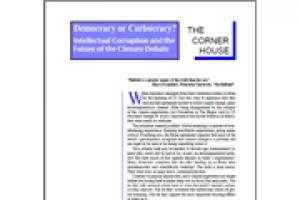A press release from the FSC UK recently claimed that the FSC label on timber and timber products gives the public an "assurance that the timber used comes from forests managed to the highest environmental, social and economic standards" and that "anyone buying FSC certified products is helping to ensure a safer future for the earth's forests and the people and wildlife that depend on them".
The Green Economy
The Green Economy is a tactic used to “clean up” the image of corporations rather than address corporate capture and capitalism as the true drivers of deforestation. False solutions promoted under the Green Economy include certification, sustainable forest management, ecosystem services, REDD+, the bioeconomy, nature-based climate solutions, and zero net deforestation. Rather than stopping it, these “solutions” support corporate-driven destruction that is causing a deep social and ecological crisis.
Other information
7 November 2002
According to the Danish Data Protection Agency, the environmental NGO Nepenthes is not allowed to advise Danish consumers against purchasing from shops where they risk buying garden furniture whose production has contributed to the destruction of rainforests.
Bulletin articles
12 August 2002
The profit-led corporate logic is determining our future, and that of generations to come, shaping the emerging international system which is today dominated by institutions that favour corporate rights. The outstanding outcome of present globalisation --privatisation and deregulation-- have allowed corporations to usurp the natural basis upon which all life depends.
Bulletin articles
12 August 2002
To put a shine on its green credentials at the World Summit on Sustainable Development, the World Bank plans to launch a new fund at Johannesburg, aimed at promoting the North-South trade in carbon credits in line with the so-called 'Clean Development Mechanism' . The 'Community Development Carbon Fund' builds on a three year experiment - the World Bank's Prototype Carbon Fund - but will be a separate initiative with its own statutes and governance structure with a specific focus on promoting small-scale projects which have a community development component.
Bulletin articles
14 June 2002
The certification granted by the Forest Stewardship Council (FSC) or what is now known as the “green label” guarantees that a company’s wood with this qualification, has been obtained on the basis of sustainable forest management practices.
Bulletin articles
14 June 2002
The Plywood Ecuatoriana S.A. logging company, belonging to the Alvarez – Barba family will end up by destroying the last primary forests existing in the zone of the Ecuadorian Choco, specifically in the province of Esmeraldas. However, this company that depredates forests has recently decided to dress in green.
Bulletin articles
14 May 2002
Liberia is a biodiversity rich country with rocky cliffs and lagoons facing the Atlantic Ocean, with plains covered by forests and savannahs, and rainforests in the highlands, crossed by rapids and waterfalls, all of which are home to the Kpelle, Bassa, Gio, Kru, Grebo, Mano, Krahn, Gola, Gbandi, Loma, Kissi, Vai, and Bella peoples. The evergreen and semi-deciduous rainforests of Liberia also harbour many and even rare and unique plant and animal species.
Bulletin articles
15 April 2002
Under pressure from Thai civil society groups, the Thai government rejected a "forest conservation" proposal by the United States (US) that would establish tree plantations to meet the US targets for reducing carbon dioxide (CO2) emissions in return for reducing debt owed by Thailand to the US.
Bulletin articles
21 December 2001
Although many NGOs believe that certification of wood and other forest products is a good idea, there are a number of doubts about whether the actual process is moving in the right direction. The issue has resulted in confrontations between environmental organizations in countries such as Brazil, where some NGOs are working hard to convince logging companies to move into Forest Stewardship Council (FSC) certification, while other NGOs accuse those same NGOs of thereby promoting further forest destruction.
Bulletin articles
27 November 2001
Located in the heart of the African continent, the Democratic Republic of Congo’s 2.3 million square kilometres territory covers most of the Congo River basin and has a narrow outlet into the Atlantic. The center and northern regions are covered with rainforests (1.1 million square kilometres in 1993) which, although sparsely populated, are the major livelihood for many of the country’s 48 million people who depend on the forests for non-timber forest products such as food, building materials and medicines.
Bulletin articles
27 November 2001
In February last year, “Río Foyel S.A.” a company set up in March 1999 and recent owner of a 7,800 hectare plot located in the zone of El Foyel, in the southern province of Rio Negro, submitted a project for the logging of four thousand hectares of ñire native forest and then reforestation of the zone with exotic Oregon and Radiata pine and the “sustainable” management of over 1,800 hectares of native species (see WRM Bulletin 38, September 2000).
Other information
30 October 2001
by Larry Lohmann, Corner House Briefing 24

